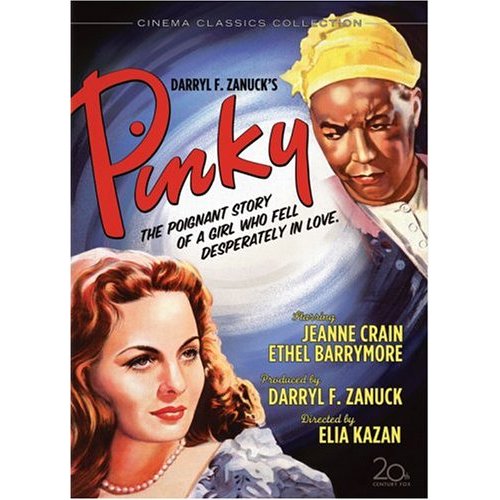- Pinky (film)
Infobox Film
name = Pinky

image_size =
caption =
director =Elia Kazan
producer =Darryl F. Zanuck
writer =Philip Dunne
Dudley Nichols
narrator =
starring =Jeanne Crain
Ethel Barrymore
Ethel Waters Nina Mae McKinney William Lundigan
music =Alfred Newman
cinematography =Joseph MacDonald
editing =Harmon Jones
distributor =20th Century Fox
released = November 1949
runtime = 102 minutes
country =United States
language = English
budget =
gross =
preceded_by = "Gentleman's Agreement "
followed_by = "Panic in the Streets "
website =
amg_id =
imdb_id = 0041746"Pinky" (1949) is a film directed by
Elia Kazan . The movie was adapted by Philip Dunne andDudley Nichols from the novel byCid Ricketts Sumner . OriginallyJohn Ford was hired to direct the film, but was replaced after one week because producerDarryl F. Zanuck was unhappy with the dailies. [DVD, "Pinky", commentary track by Kenneth Geist.] AlthoughLena Horne andDorothy Dandridge were considered for the role, producerDarryl F. Zanuck chose to cast a white actress for box-office reasons. Released byTwentieth Century Fox , it starredJeanne Crain ,Ethel Barrymore (who was screenwriter Philip Dunne's godmother),Ethel Waters , andNina Mae McKinney .Plot introduction
The film tells the story of a young lightskinned
African American woman passing as white, who becomes torn between the needs of her grandmother and the love of a white doctor.Critical reception
Because of its subject matter, "Pinky" was a controversial movie, and was even banned by the city of
Marshall, Texas . W. L. Gelling managed the Paramount Theater, a segregated theater in which African-Americans sat in the balcony. Gelling booked Pinky for exhibition in February 1950. In 1950, theFirst Amendment did not protect movies.Mutual Film Corporation v. Industrial Commission of Ohio . The City Commission of Marshall “reactivated” the Board of Censors established by a 1921 ordinance and designated five new members who demanded the submission of the picture for approval. The Board disapproved its showing, stating in writing its “unanimous opinion that the said film is prejudicial to the best interests of the citizens of the City of Marshall.” Gelling nonetheless exhibited the film and was charged with a misdemeanor. Three members of the Board of Censors testified that they objected to the picture because it depicts (1) a white man retaining his love for a woman after learning that she is a Negro, (2) a white man kissing and embracing a Negro woman, (3) two white ruffians assaulting Pinky after she has told them she is colored. Gelling was convicted and fined $200. He appealed the conviction all the way to theU.S. Supreme Court . After Gelling filed his appeal, the Court decided landmark free speech case ofJoseph Burstyn, Inc v. Wilson that extendedFirst Amendment protection to films. The Court then overturned Gelling’s conviction. [cite web| url=http://supreme.justia.com/us/343/960/case.html | title="Gelling v. State of Texas", 343 U.S. 960 (1952) | accessdate=2007-08-22]It was nominated for
Academy Awards for Best Actress in a Leading Role (Jeanne Crain ), Best Actress in a Supporting Role (Ethel Barrymore ) and Best Actress in a Supporting Role (Ethel Waters ).A clip from "Pinky" is shown playing on a television in
Curtis Hanson 's film,Eight Mile , which delves into trans-racial boundary issues throughout.References
External links
*
Wikimedia Foundation. 2010.
